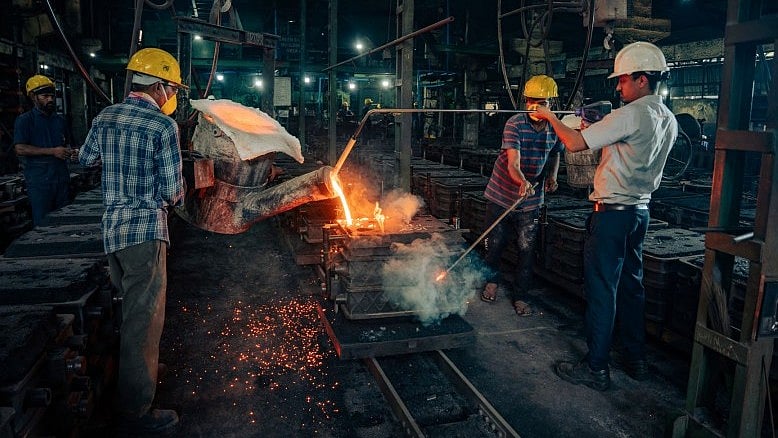
According to Bureau of Energy Efficiency (BEE) Director P Shyam Sunder,the Kolhapur foundry cluster could be part of the Assistance in Deploying Energy Efficient Technologies in Industries & Establishments (ADEETIE) scheme.
Credit: Kolhapur Report
Mumbai: The Kolhapur Foundry Cluster, one of India’s largest hubs for automotive and engineering castings, has commenced taking crucial steps towards sustainability with the launch of a first-of-its-kind collaborative decarbonisation model.
The initiative seeks to transform over 300 foundry units, aiming to be one of India’s leading green MSME hubs while enhancing their competitiveness in domestic and international markets.
The Kolhapur Foundry Cluster, one of India’s largest hubs for automotive and engineering castings, has begun taking steps towards sustainability by developing a collaborative decarbonisation model, aiming to be one of the first MSME green clusters in India.
A report titled — “Forging a greener future together: Decarbonising Kolhapur’s foundries one step at a time” — documented a first-of-its-kind roadmap for transitioning MSME foundries towards low-carbon growth.
It draws on detailed assessments conducted in a pilot study in three units within the Kolhapur Foundry Cluster to identify practical opportunities for improving energy efficiency, adopting renewable energy, and reducing greenhouse gas emissions.
As part of this report, a pilot study was undertaken across three model foundries — Ramkrishna Foundry Pvt Ltd, Mahalaxmi Ferro Cast Pvt Ltd, and Kohinoor Metallics — to evaluate feasible pathways for decarbonisation at the unit level. The study identified 11 targeted energy conservation measures (ECMs) with significant potential to reduce energy consumption and emissions. Several measures, including optimisation of energy management, require no upfront investment and can deliver equipment-specific energy savings of 9 to 45%, resulting in immediate improvements to operational margins. In addition, technology upgrades, including high-efficiency motors, advanced air compressors, and digital monitoring systems, were found to provide attractive returns on investment, with most achieving payback periods of less than two years.
The report by Asar Social Impact Advisors (Asar) was launched by Kolhapur District Collector Amol Yedge.
Asar, along with Decarbonisation India Alliance (DIA), Indian Institute of Management (IIM) Nagpur, Institute of Indian Foundrymen (IIF) - Kolhapur Chapter, and Kolhapur Foundry and Engineering Cluster’s Centre of Excellence (CoEK), convened a diverse group of stakeholders, including decision-makers, financers, industry experts, and solution providers, to deliberate on a decarbonisation pathway for Kolhapur’s foundries.
“Long-term planning must factor in climate impacts, which are already affecting markets. Even small measures can lead to significant achievements. The Government of Maharashtra is taking steps to scale renewable energy projects, with solar expected to play a major role. Foundries are central to the vibrant economy of Kolhapur and the state, and must take the lead in decarbonisation to become an exemplar cluster,” he said.
Kolhapur produces nearly 600,000 tonnes of castings annually, serving key sectors including automotive, agriculture, and heavy machinery. With almost 30 percent of this production exported to Europe, Southeast Asia, and the Middle East, the cluster’s ability to meet evolving sustainability norms has become increasingly critical. Global buyers are prioritising low-carbon supply chains, and with the European Union’s Carbon Border Adjustment Mechanism (CBAM) already in effect, reducing emissions has become essential for maintaining market access and unlocking new opportunities abroad.
According to Bureau of Energy Efficiency (BEE) Director P Shyam Sunder,the Kolhapur foundry cluster could be part of the Assistance in Deploying Energy Efficient Technologies in Industries & Establishments (ADEETIE) scheme.
“These findings form the technical foundation of the decarbonisation model presented in the report and demonstrate how MSME foundries can transition to cleaner operations through practical, step-by-step interventions,” said Vishwajeet Poojary, Lead, State Climate Action, Asar, and one of the authors of the report.
“MSMEs have opportunities for technology upgradation, skills, and innovation along with prototyping. As technology evolves, it will impact all sectors such as steel, cement, and others. Our aim is to work with all stakeholders and make Kolhapur a world-class example of a pioneering cluster,” added Dr. Suhas Buddhe, Director, Centre of Excellence for Corporate Governance, CSR & Sustainability (CGCS), IIM Nagpur.